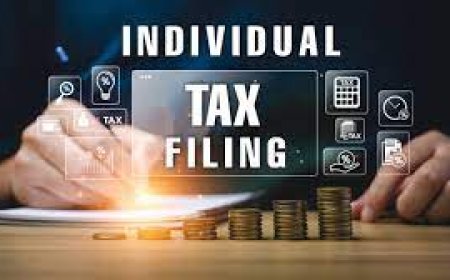DSCR Loans: A Smart Way to Secure Financing for Income-Producing Properties and Businesses
A DSCR loan is a financing option that focuses on a property or business's Debt Service Coverage Ratio (DSCR), assessing its income ability to cover debt obligations. It's ideal for real estate investors and business owners with strong cash flow but less-than-perfect credit, offering flexible terms, lower interest rates, and larger loan amounts based on financial performance.

If you're a real estate investor or business owner looking for flexible financing options, youve probably encountered the term DSCR loan. In a world where credit scores are often the primary determinant for securing loans, DSCR loans offer a refreshing alternative. By focusing on the income generated by your property or business rather than personal credit, DSCR loans can be a great solution for those with strong cash flow but less-than-perfect credit. In this article, well explore what a DSCR loan is, how it works, and the benefits it offers.
What is a DSCR Loan?
A DSCR loan (Debt Service Coverage Ratio loan) is a type of financing where the lender evaluates the ability of the borrower to repay the loan based on the cash flow of the property or business rather than personal creditworthiness. The Debt Service Coverage Ratio (DSCR) is a financial ratio that compares a property or businesss net operating income (NOI) to its debt obligations. This ratio is used to determine the likelihood of a borrower being able to cover their debt payments from the income generated by the property or business.
Formula for DSCR:
Where:
-
Net Operating Income (NOI) is the total income generated by the property or business after operating expenses are deducted, excluding taxes and interest.
-
Debt Service refers to the total debt payments (both principal and interest) the borrower is required to make over a specific period (usually annually).
For example, if a property generates $180,000 in income annually, and the debt obligations are $150,000, the DSCR would be:
A DSCR of 1.2 means the property generates 20% more income than what is needed to cover its debt obligations, which is a positive sign for lenders.
How Does a DSCR Loan Work?
In a DSCR loan, lenders assess the financial performance of the property or business that will be used as collateral. They focus on the propertys or businesss ability to generate income and cover debt obligations, making it an ideal option for income-producing properties such as rental real estate, multifamily units, office buildings, and even businesses like restaurants or hotels.
Heres how a DSCR loan typically works:
-
The lender evaluates the DSCR to determine if the income from the property or business is sufficient to cover the debt service.
-
If the DSCR is greater than 1.0, it indicates that the property or business generates more than enough income to meet its debt obligations.
-
If the DSCR is less than 1.0, it means the property or business is not generating enough income to cover its debt, which makes the loan riskier for the lender.
Lenders typically look for a minimum DSCR of 1.0 but prefer a higher ratio (1.2 or above) for more favorable loan terms. A higher DSCR shows that the property or business is more financially stable, which lowers the lender's risk.
Benefits of a DSCR Loan
-
Income-Based Qualification: DSCR loans primarily focus on the property or businesss income rather than the borrowers personal credit score. This is particularly beneficial for investors with strong cash flow but less-than-perfect credit histories.
-
Easier Access for Real Estate Investors: DSCR loans are ideal for real estate investors who own properties that generate consistent rental income. These loans can help you acquire more properties, refinance existing loans, or fund repairs and improvements.
-
Lower Interest Rates: If the property or business has a high DSCR, the lender may offer better loan terms, including lower interest rates. A high DSCR indicates less risk for the lender, which can translate into more favorable financing terms for the borrower.
-
Larger Loan Amounts: A higher DSCR may also qualify the borrower for a larger loan amount, as the income generated by the property can comfortably cover larger debt obligations. This can be especially advantageous when looking to purchase or refinance a property with significant value.
-
Flexible Qualification Criteria: Traditional loans often have strict requirements regarding personal credit scores, making them inaccessible for some borrowers. In contrast, DSCR loans are more focused on the financial performance of the property or business, which can lead to more flexible terms and easier loan approval.
Types of Properties and Businesses Suitable for DSCR Loans
DSCR loans are typically used for commercial real estate and income-producing businesses. Here are a few examples of properties and businesses that can benefit from DSCR loans:
-
Residential Rental Properties: Single-family homes, multifamily units, apartment buildings, etc.
-
Commercial Real Estate: Office buildings, retail centers, industrial properties, warehouses, etc.
-
Hospitality: Hotels, motels, resorts, and other income-generating hospitality properties.
-
Business Financing: Restaurants, healthcare businesses, franchises, and other income-producing businesses.
DSCR Loan Requirements
While DSCR loans offer more flexibility than traditional loans, lenders still have certain criteria that must be met for approval:
-
Minimum DSCR: Lenders typically require a minimum DSCR of 1.0, though many prefer a higher ratio (1.2 or more) for a smoother approval process and better terms.
-
Net Operating Income (NOI): The property or business must demonstrate consistent and stable income over a period of time. Lenders want to see that the income will reliably cover the debt obligations.
-
Collateral: The loan is secured by the property or business that generates income. The lender will typically assess the value and income-producing potential of the collateral.
-
Type of Asset: DSCR loans are most commonly used for income-producing real estate and businesses. Its important to demonstrate that the property or business has the potential to generate enough income to cover debt service.
How to Improve Your DSCR for a Better Loan
If your DSCR is below 1.0, there are several strategies to improve it:
-
Increase Revenue: You can raise rents for your property, improve occupancy rates, or find additional income streams. For businesses, increasing sales or expanding operations can help boost income.
-
Reduce Operating Expenses: Lowering operating costs can improve your Net Operating Income (NOI), which in turn improves your DSCR.
-
Refinance Debt: Refinancing existing debt to lower interest rates or extend repayment terms can reduce your debt service, improving your DSCR.
Conclusion
A DSCR loan is an excellent option for real estate investors and business owners who have strong, stable cash flow but may not have perfect credit. By focusing on the financial performance of the property or business rather than personal credit scores, DSCR loans offer more flexibility and can provide better financing options. Whether you are looking to acquire more properties, refinance, or expand your business, understanding how DSCR loans work and how to optimize your DSCR ratio can help you unlock financing opportunities and grow your investment portfolio or business.
If you're interested in securing a DSCR loan, be sure to consult with a financial advisor or lender who can help you understand your options and determine if this type of financing is right for your needs.






































